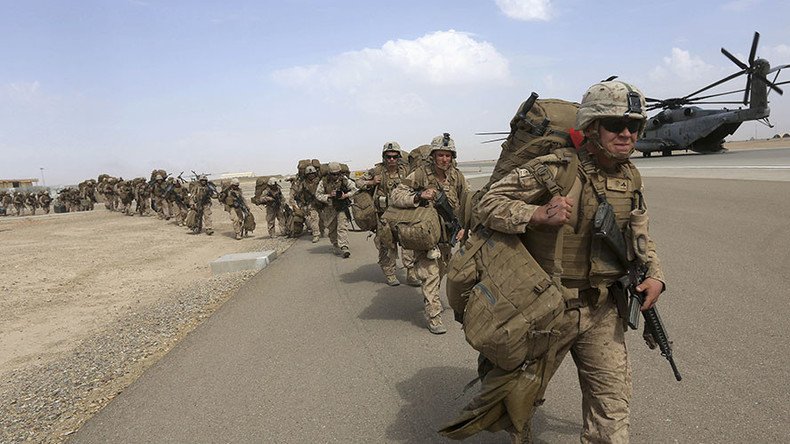'No light at end of this tunnel, US can’t win Afghanistan war'

The Pentagon is not fighting to win the war in Afghanistan, but not to have the perception the US lost the war, said Brian Becker from the ANSWER Coalition. Any troop surge in Afghanistan will not be decisive, he added.
Afghanistan’s ambassador to the US said local Afghan forces should be able to deal with the Taliban threat themselves by 2020.
However, the Pentagon keeps considering whether to send more troops to the country. General Joseph Votel, Commander of the US Central Command, recently said he anticipated an increase in troops stationed in Afghanistan.
“We are developing a strategy, and we are in discussions with the secretary and the department right now,” he told the Senate Armed Services Committee. “I do believe it will involve additional forces to ensure that we can make the advise-and-assist mission more effective.”
RT: Do you feel the US military is going in circles? They continue to ask for an increased military presence, yet the situation on the ground is not changing?
Brian Becker: General Votel’s request for a troops surge in Afghanistan comes almost exactly eight years after President Obama carried out a troop surge, at that time with more than 30,000 additional troops in Afghanistan. Here we are eight years later: the war is not over, the war continues. It now continues to be the longest war in US history. Any troop surge in Afghanistan will not be decisive. The American people won’t tolerate sending hundreds of thousands of troops so that it would be a smaller surge. Nonetheless, it won’t “win the war.”
Army airborne unit avoids ax, assigned from Alaska to Afghanistan https://t.co/QguA8umd26pic.twitter.com/3mXTZUed11
— RT America (@RT_America) 7 апреля 2017 г.
The real problem is – the US can’t win the war. The Pentagon knows that it can’t win the war. It is not fighting to win the war anymore. It is fighting not to have the perception that it lost the war. More and more American young people: soldiers, sailors, marines are being sent to Afghanistan. Some will be killed; some will be injured; many Afghans will die. That is the strategy; there is no light at the end of this tunnel.
RT: Could this be another Vietnam – a lost war with little chance of success the US government cannot let go?
BB: The component that existed in Vietnam and that is missing in Afghanistan is that in the Vietnam War in 1967-1972 millions of Americans were in the street demanding the war end. There could be no expectation that the war could be won. So there was mounting pressure at home to stop the war in Vietnam. The US could not win the war. The US can’t win the war in Afghanistan. But the missing component here is that huge surge of anti-war opinion among the population. The reason for that is that US military planners have made sure that the numbers of US casualties are very low. All the bleeding is done on the other side, in other words, precisely in order to prevent massive anti-war sentiment from growing in the US that would be political pressure on this government or any American government.
1 dead, 4 injured in explosion at US Army ammunition plant https://t.co/M5fpNAjDqHpic.twitter.com/qUbCIrOSb1
— RT America (@RT_America) 12 апреля 2017 г.
RT: Could the indifference of the American people be the result of the lack of a mandatory draft, where people think that this war is far away and does not concern them?
BB: Yes, the combination of the absence of a selective service – a conscripted army, whereby the burden of a foreign war had to be shared by the entire population, and the low number of American casualties… – the two things that have prevented the crystallization of mass anti-war sentiment as existed during the Vietnam War.
When I was a young kid, every year we were thinking: “Oh, in four years, in three years, in two years I will be 18, I will be drafted.” So for every family that had a young male in the family, the entire family had to deal with the question: “Do we support the war? Do we want our son to go and fight, perhaps be killed?” That is absent right now with the volunteer army. A very small part of the American people feel the burden of the foreign war.
Here we are in 2017 – almost 16 years since the beginning of the US invasion of Afghanistan that began in October 2001. The Taliban probably controls more territory now than in did when it was the government of Afghanistan. At that time it couldn’t control Northern Afghanistan. The country was severely divided by the warlords following the fall of the socialist government of Afghanistan in the early 1990’s. I think the US knows they can’t win. They don’t want to leave. They know that Afghanistan will be effectively partitioned, but at least some parts of Afghanistan will remain under American control.
The statements, views and opinions expressed in this column are solely those of the author and do not necessarily represent those of RT.












